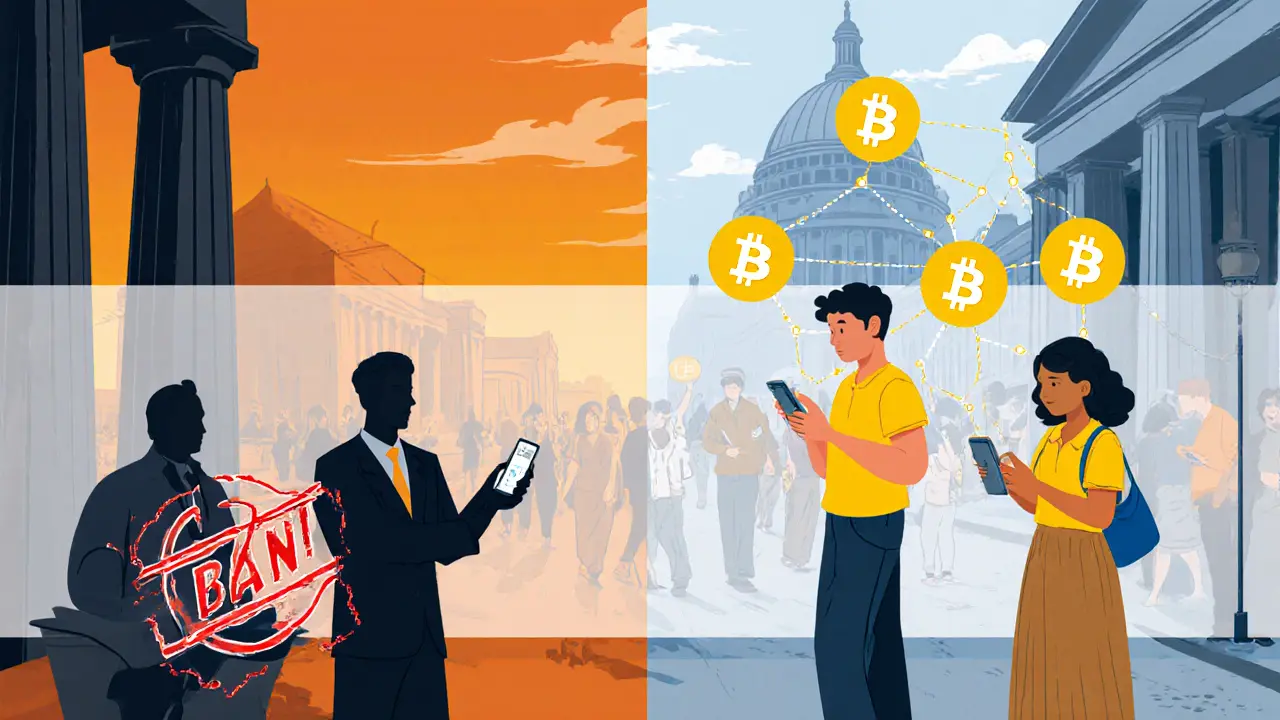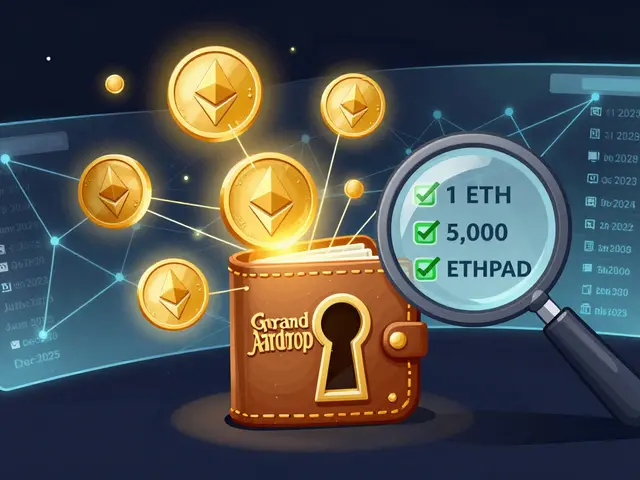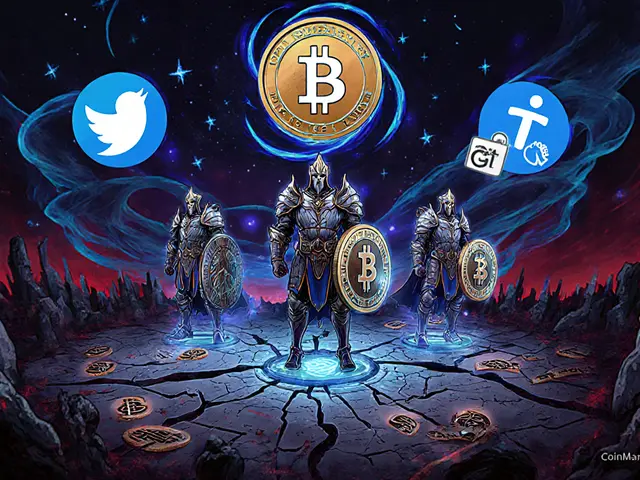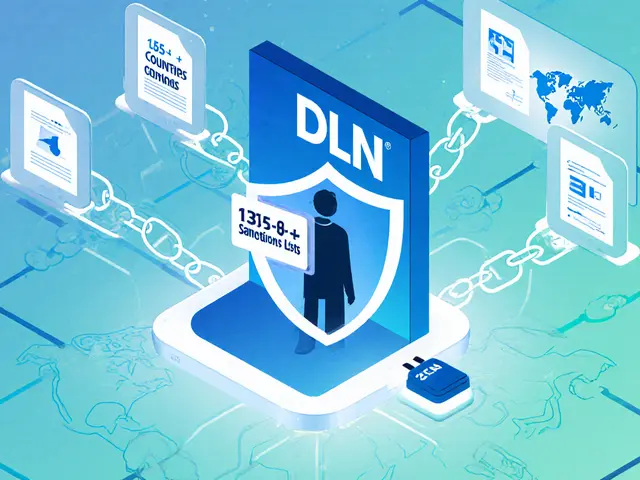Grassroots Crypto Adoption Comparison Tool
Explore how different countries experience grassroots crypto adoption by comparing key drivers such as economic conditions, regulatory environment, and typical use cases.
🇳🇬 Nigeria
- High inflation (24% in 2023)
- Capital controls limit foreign exchange
- 36% unbanked population
- Low remittance fees via crypto
🇺🇸 United States
- Strong banking infrastructure
- Focus on DeFi and speculative trading
- Near-universal banking access
- Regulated frameworks (e.g., GENIUS Act)
| Factor | Nigeria | United States |
|---|---|---|
| Primary Driver | Economic necessity - hedge against inflation | Investment & innovation - speculative assets |
| Banking Access | 36% unbanked | Near-universal access |
| Regulatory Stance | Ban on crypto services | Shift to regulated frameworks |
| Use Case | Remittances, store of value | Speculative trading, DeFi |
| Education Method | Social media, peer groups | Online courses, webinars |
When governments try to shut down digital money, everyday people often find a way around the roadblocks. Across the globe, especially in economies rattled by high inflation and weak banking systems, citizens are turning to crypto as a practical alternative. This article unpacks how grassroots crypto adoption unfolds, why it keeps growing despite bans, and what the ripple effects mean for regulators and everyday users.
Key Takeaways
- Economic distress-high inflation, capital controls, and weak banking-creates fertile ground for crypto.
- Grassroots adoption spreads through peer‑to‑peer networks, social media, and community education, not through banks.
- Nigeria illustrates the most documented success story, ranking second worldwide in crypto usage by 2024.
- Even strict bans can’t fully stop adoption; they often push activity into decentralized channels.
- Governments tend to shift from outright bans to regulated frameworks once adoption reaches a critical mass.
What Is Grassroots Crypto Adoption?
Grassroots cryptocurrency adoption is the bottom‑up embrace of digital assets by ordinary citizens, often in response to economic hardships or limited access to traditional banking. It differs from institutional uptake because it relies on informal networks, community‑run education, and personal necessity rather than corporate investment or government endorsement.
Why Bans Alone Don’t Stop the Momentum
Governments usually ban crypto to protect monetary sovereignty, combat fraud, or preserve tax revenues. Yet the technology itself is decentralized-no single authority can shut down the network. When bans are enforced, users simply shift to peer‑to‑peer (P2P) exchanges, VPNs, or offshore wallets. This creates a cat‑and‑mouse game where enforcement costs rise while adoption continues to spread.
Nigeria: A Ground‑Zero Case Study
Nigeria provides the clearest picture of how grassroots adoption can outpace regulation. By 2024 the country ranked second globally in crypto usage, despite a 2023 ban on digital asset services. Several forces converged:
- Inflation surged past 24% in 2023, eroding the purchasing power of the naira.
- Capital controls limited citizens’ ability to move money abroad, making crypto an attractive loophole.
- Approximately 36% of adults remain unbanked, forcing many to rely on cash or informal savings groups.
- Remittance fees could reach 8% per transaction, while a Bitcoin transfer costs a fraction of that.
These pressures turned crypto into a survival tool: a hedge against devaluation, a cheap channel for remittances, and a gateway to global markets.
How Communities Learn and Share Crypto Knowledge
With no top‑down education programs, Nigerians have built their own learning ecosystems:
- WhatsApp and Telegram groups circulate tutorials on wallet setup and safe trading.
- Local influencers host live streams in regional languages, demystifying concepts like private keys.
- Community hubs-often coffee shops or market stalls-act as informal P2P exchange points.
This organic spread mirrors the way mobile money grew in Kenya, relying on word‑of‑mouth and trusted social circles.

Comparing Grassroots Drivers: Nigeria vs. United States
| Factor | Nigeria | United States |
|---|---|---|
| Primary driver | Economic necessity - hedge against inflation and currency controls | Investment & innovation - speculative assets and tech curiosity |
| Banking access | 36% unbanked, limited formal services | Near‑universal banking coverage |
| Regulatory stance (2024‑2025) | Ban on crypto services, enforcement through bank closures | Shift from resistance to regulated frameworks (GENIUS Act, Trump admin support) |
| Typical use case | Remittances, store of value, cross‑border trade | Speculative trading, decentralized finance (DeFi) participation |
| Community education | Peer‑to‑peer groups, social media, informal meetups | Online courses, institutional webinars, media coverage |
Regulatory Evolution: From Ban to Acceptance
History shows that stubborn bans often transform into regulated acceptance once adoption becomes entrenched. In the United States, the 2025 GENIUS Act created a clear framework for stablecoins, requiring full‑reserve backing. The same year, the Trump administration issued an executive order championing the responsible growth of digital assets.
These policy shifts echo what happened in Nigeria: after months of heavy enforcement, authorities recognized that outright prohibition was counter‑productive. While the central bank still warns against crypto, it now monitors large transactions rather than attempting to shut down P2P networks entirely.
Implications for the Global Financial System
Grassroots crypto adoption reshapes the financial landscape in three ways:
- Financial inclusion: Unbanked individuals gain a store of value and a payment method.
- Remittance disruption: Traditional corridors face competition from faster, cheaper blockchain routes.
- Regulatory pressure: Governments must balance control with the reality that digital assets will operate whether they like it or not.
As more emerging markets follow Nigeria’s example-think Ghana, Kenya, and the Philippines-the cumulative effect could be a sizeable shift toward decentralized finance on a global scale.
Challenges and Risks for Grassroots Users
Despite the benefits, everyday adopters face real dangers:
- Scams thrive in unregulated spaces; without consumer protection, victims can lose everything.
- Price volatility can turn a hedge into a loss if users don’t understand market swings.
- Regulatory crackdowns can freeze access to exchanges, forcing users onto less secure platforms.
Education-often delivered through community channels-remains the best defense against these pitfalls.
Future Outlook: Will Bans Fade Away?
Current trends suggest that outright bans will become rarer. Governments are crafting nuanced rules that allow innovation while attempting to curb illicit activity. For grassroots adopters, the key indicators of a sustainable ecosystem are:
- Continued high inflation or currency instability in their home country.
- Broad smartphone penetration and affordable internet.
- Persistent community‑driven education and support networks.
When these three align, crypto will likely remain a fixture, regardless of what the law says on paper.
Frequently Asked Questions
What does ‘grassroots’ mean in the crypto context?
It refers to adoption that starts at the community level, driven by individuals rather than banks, corporations, or governments. People learn from friends, local groups, and online forums, and they use crypto to solve everyday financial problems.
Why did Nigeria adopt crypto so quickly despite the ban?
Three forces stacked up: hyperinflation eroding the naira, strict capital controls limiting foreign exchange, and a large unbanked population. Crypto offered a cheap, fast way to protect value and receive remittances, pushing people to use it regardless of the legal warning.
Can I safely buy Bitcoin if I live in a country with a crypto ban?
Safety depends on how you access it. Peer‑to‑peer platforms, VPN‑protected wallets, and decentralized exchanges avoid centralized choke points, but they also lack consumer protections. Do thorough research, use hardware wallets, and never invest more than you can afford to lose.
What is the GENIUS Act and why does it matter?
Passed in July2025, the GENIUS Act sets a federal framework for stablecoins, requiring 1:1 backing with cash or short‑term liquid assets. It signals that even after years of uncertainty, the U.S. government is ready to regulate crypto in a way that can coexist with mainstream finance.
Will other developing nations follow Nigeria’s path?
Very likely. Countries facing similar inflation, weak banking, and high remittance fees-like Ghana, Tanzania, or the Philippines-already show spikes in crypto activity. When economic pressure mounts, grassroots adoption becomes a logical escape route.



 Finance
Finance





Lara Cocchetti
December 5, 2024 AT 21:20Anyone looking at the crypto surge in Nigeria should ask themselves who’s really pulling the strings. The narrative of "grassroots freedom" masks a deeper agenda to destabilize sovereign currencies in favor of a globalist digital order. When governments clamp down, they think they’re protecting their citizens, but they’re also driving them straight into the hands of offshore operators. It’s not about empowerment; it’s about creating dependence on a system that can be controlled from a boardroom in a different continent. Remember, every revolution needs a supply chain, and crypto is now that supply chain.
Linda Welch
December 8, 2024 AT 00:09America leads the world in innovation and we watch other nations scramble to copy us it’s amusing how they think their little crypto hacks can catch up to US tech we have the best exchanges and the smartest traders yet they still cling to outdated bans and regulations, obviously they’re just jealous of our market dominance and don’t understand the true potential of decentralized finance, keep trying you’ll never match the US.
meredith farmer
December 10, 2024 AT 02:59The streets are buzzing, the markets are trembling and every night I hear whispers of people losing their savings to a new kind of uncertainty. It’s dramatic, it’s heartbreaking, and it’s a sign that something bigger is happening beneath the surface. While officials claim they’re protecting us, the reality feels like a stage play where the audience never knows the script. The tension is palpable, and the stakes have never been higher for ordinary folks trying to keep a lid on their finances.
Krithika Natarajan
December 12, 2024 AT 05:48I respect the community’s effort to share knowledge and help each other navigate this complex space. It’s encouraging to see people from different backgrounds come together and teach the basics in simple terms. Keep the conversation kind and supportive, and remember that many are still learning the ropes.
Ayaz Mudarris
December 14, 2024 AT 08:37From an analytical perspective, the phenomenon of grassroots crypto adoption warrants a multi‑dimensional examination. Firstly, the macro‑economic catalysts, notably hyperinflation and capital controls, create a compelling incentive structure for individuals to seek alternative stores of value. Secondly, the technological accessibility afforded by ubiquitous smartphones facilitates the diffusion of blockchain wallets across demographic strata previously excluded from formal finance. Thirdly, the sociological dimension cannot be overstated; peer‑to‑peer networks function as informal educational institutions, transmitting tacit knowledge through trust‑based channels. Moreover, the regulatory environment exerts a paradoxical influence: prohibitive statutes may inadvertently accelerate decentralised activity by driving users toward peer‑to‑peer exchanges and offshore platforms. Empirical data from Nigeria illustrates a marked increase in P2P transaction volume coinciding with the enforcement of the 2023 ban, underscoring the limited efficacy of top‑down interdiction. In contrast, the United States demonstrates a divergent trajectory, wherein regulatory clarity-exemplified by the GENIUS Act-has fostered institutional participation while preserving avenues for retail involvement. This bifurcation suggests that adaptive governance, rather than outright prohibition, may better accommodate emergent financial ecosystems. Financial inclusion metrics improve as unbanked populations acquire digital assets, thereby expanding the velocity of money within informal economies. Nevertheless, systemic risks persist, particularly concerning market volatility and the proliferation of fraudulent schemes in unregulated spaces. Hence, a calibrated policy response that balances consumer protection with innovation incentives is paramount. In summation, the confluence of economic necessity, technological diffusion, and social network dynamics constitutes the engine of grassroots crypto adoption, a reality that policymakers must acknowledge to formulate effective frameworks.
Irene Tien MD MSc
December 16, 2024 AT 11:27Oh sure, let’s all just ignore the fact that every little “community hack” is secretly funded by a cabal of shadowy financiers who love watching ordinary people scramble to keep up with the latest meme‑coin hype. It’s almost adorable how the narrative flips-government bans are painted as heroic resistance, while the real power brokers sit behind encrypted servers, sipping artisanal coffee and counting their digital gold. The drama is priceless, and the only thing missing is a soundtrack of ominous violins every time someone mentions a “decentralised future”.
Kevin Fellows
December 18, 2024 AT 14:16It’s awesome seeing people find real solutions to real problems-keep it up!
Alie Thompson
December 20, 2024 AT 17:06When governments outlaw what people need to survive, they cross a moral line that should never be justified by any bureaucratic excuse. The bans on crypto services in Nigeria are not merely regulatory oversights; they are deliberate attempts to curtail economic freedom and entrench an inequitable status quo. By criminalising the very tools that enable the unbanked to preserve wealth, authorities betray a foundational principle of governance: to protect, not to oppress. Such policies must be condemned in the strongest possible terms, and the international community should hold these regimes accountable for infringing on basic financial rights.
Samuel Wilson
December 22, 2024 AT 19:55From a coaching standpoint, the key to sustainable adoption lies in establishing clear learning pathways. Start with basic wallet creation, progress to secure private‑key handling, and then explore transaction mechanics. Encourage peer mentorship, and track milestones to maintain motivation. This structured approach mirrors effective skill‑building in any discipline.
Rae Harris
December 24, 2024 AT 22:44Looks like everyone’s singing the same crypto anthem while ignoring the underlying volatility that makes this whole thing a speculative roller‑coaster. In reality, the “grassroots” narrative is just hype layering over a market that’s still driven by speculation, liquidity crunches, and occasional pump‑and‑dump cycles. If you strip away the buzzwords, you’ll see it’s still a high‑risk arena, not some guaranteed financial lifeline.
Danny Locher
December 27, 2024 AT 01:34It’s clear that crypto offers new options for people who can’t access banks, but it also brings challenges like scams and price swings. The community’s role in teaching safe practices is essential, and the balance between innovation and protection will shape how this technology matures.
Emily Pelton
December 29, 2024 AT 04:23Hey everyone, let’s remember that while we’re diving into these new tools, we should also look out for each other, share reliable resources, and keep the conversation respectful, because collaboration, patience, and a willingness to learn are the real keys to making this work for all of us.
sandi khardani
December 31, 2024 AT 07:13The current discourse on grassroots adoption is riddled with oversimplifications that ignore the systemic vulnerabilities inherent in a largely unregulated ecosystem. While the enthusiasm is commendable, it masks the fact that a significant portion of participants lack the technical literacy to safeguard their assets, making them prime targets for phishing, rug pulls, and other malicious exploits. Moreover, the narrative that bans merely push activity to “decentralized channels” neglects the reality that these channels often lack the resilience and consumer protections present in traditional financial infrastructures. Consequently, the purported empowerment becomes a double‑edged sword, offering access while simultaneously exposing users to heightened risk. It is imperative that analysts adopt a more nuanced perspective that weighs both the potential benefits and the glaring shortcomings of this phenomenon.
Christina Norberto
January 2, 2025 AT 10:02It is a philosophical inevitability that societies, when faced with oppressive monetary policies, will invariably gravitate toward alternative mechanisms of exchange, yet such a transition cannot be romanticized as a panacea. The very structure of decentralized ledgers, while ostensibly resistant to centralized control, is nonetheless vulnerable to the caprices of market sentiment and the machinations of vested interests seeking to exploit informational asymmetries. One must therefore regard the surge in grassroots crypto usage not as a triumph of liberty, but as a symptom of systemic failure, demanding a rigorous, interdisciplinary remediation rather than hasty glorification.
Fiona Chow
January 4, 2025 AT 12:51Honestly, it’s refreshing to see both sides of the argument laid out-crypto isn’t a silver bullet, but it also isn’t the devil. The key is to stay informed, question hype, and recognize that every financial tool has trade‑offs. Keep the dialogue open and the sarcasm light.
Rebecca Stowe
January 6, 2025 AT 15:41Great points all around; let’s keep encouraging each other and stay hopeful about finding balanced solutions.
Aditya Raj Gontia
January 8, 2025 AT 18:30The data shows a moderate uptick in crypto activity in emerging markets, but further analysis is needed.
Kailey Shelton
January 10, 2025 AT 21:20Interesting.